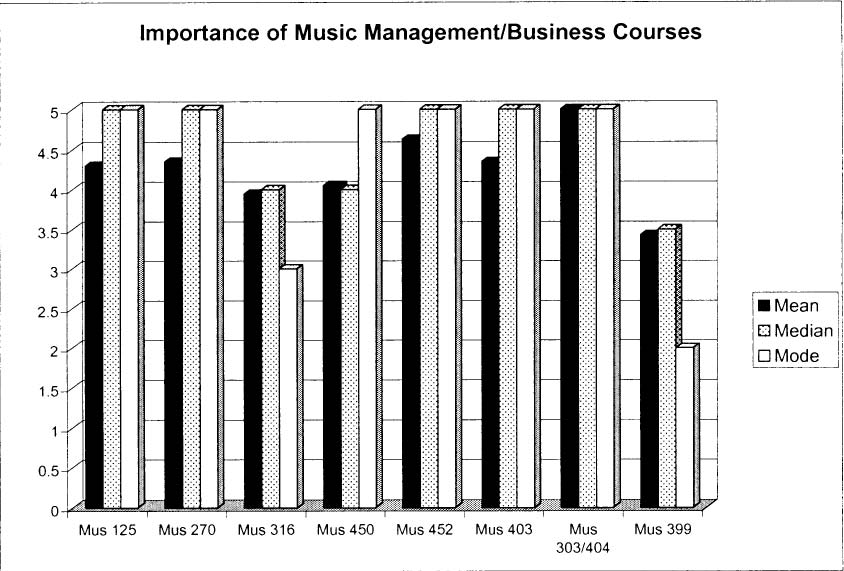
MEIEA
Journal Vol 4 No 1 © 2004 Music & Entertainment
Industry Educators Association All rights reserved
Marcone, Stephen (2004). The
Opinions of Music Management Graduates on Music Management Curriculum, MEIEA
Journal Vol 4 No 1, 43-59.
The
Opinions of Music Management Graduates on Music Management Curriculum
Stephen
Marcone
The William
Paterson
University of New Jersey
This paper has two purposes. One is to replicate, for comparison with The William Paterson University of New Jersey, a study completed by Claudia McCain at Western Illinois University. Dr. McCain presented her study at the 2001 MEIEA (Music and Entertainment Industry Educators Association) conference. The study was later published in the 2002 MEIEA Journal. The curricula are very similar at these two universities, and since both institutions are not the flagship campuses of their respective states, the student bodies are also similar.
The second purpose is to present the results of a survey administered to music management graduates. These graduates were asked to rate the importance of typical course offerings in a music management/business curriculum and to state their opinions as to which courses should be required in preparing students for careers in the music industry. Courses evaluated (according to the work completed in 1999-2000 by Dr. McCain) are typically found in a music business program housed in a music department with a goal of preparing students for careers in the business side of the music industry. [Editor’s note: a complete copy of the survey may be found on pages 54-57.]
Procedures
Graduates were asked to evaluate the “music business core,” the “business core,” the “music core,” and the “General Education core,” required of the music business major. Graduates were asked to use a five-point Likerttype scale (1 = not important, 5 = very important) to rate the degree of importance of offering each course. They were instructed to answer each as it relates to the industry in general rather than to their specific careers. Graduates were then asked to identify which of the music business courses and business courses they felt should be required of the music business major. Graduates were also asked to comment on all the areas, and to identify if they were currently employed in the music industry.
Fifty-two William Paterson University music management graduates were surveyed anonymously to identify their opinions as to the importance of each course in the curriculum that they completed. The William Paterson University Alumni Office provided the mailing addresses. Because the music management degree at William Paterson University is a Bachelor of Music (B.M.), a minor has been established to accommodate students who do not perform on an instrument or sing. Non-performers select this minor track. The minor includes the majority of required courses excluding applied lessons. For this reason, Bachelor of Arts (B.A.) music graduates who minored in music management were also sent the survey.
After a second solicitation for responses, a total of 23 surveys were returned: 17 by graduates who are currently in the industry and 3 by those who are not currently employed in the industry (a 38% response). (3 of the returned survey were returned by the post office due to incorrect addresses.)
Results
The author originally intended to present the survey responses by groups (those employed in the industry, and those not employed in the industry) as well as the aggregate. However, because only three of the respondents were not currently employed in the industry it was determined that the group was too small to draw reliable conclusions from the data. Consequently, only the aggregate data was used.
The Music Management/Business Core
The music management/business core includes seven required courses and one 1-credit elective (Surviving in the New Millennium). Respondents rated the seven required courses as “very important” (mean score of 3.94 or higher), including a mean score of 5 for the music management internship. All but one required course (Media Use) received a mode score of 5. The elective course received a 3.429 mean score (see Figure 1).
One conclusion that can be drawn from this data is that the respondents consider the required coursework very important. When asked whether the major courses should be required, each required course received a positive response of 65% or higher from the group, with the music management internship receiving a positive vote from all respondents. The non-required course received only a 30% positive recommendation from the group. Several respondents commented on the need for a course in record company operations (see Figure 2).

Figure 1. Respondents rate the importance of music management/business courses on a 1-5 scale.
MUS125 (Survey of the Music and Entertainment Industry) MUS270 (Structure and Content of the Music Industry) MUS316 (Media Use in Music Industry) MUS450 (Personal Management in Music) MUS452 (Law and Ethics in the Music and Entertainment Industry) MUS403 (Music Management Seminar) MUS303/404 (Music Management Internship) MUS399 (Surviving in the New Millennium)
The Business Core
The business core includes six required courses plus the completion of one of the three right-most courses in Figure 3. Three of the required courses, Computer Literacy, Business Law, and Marketing received a mean score of 4 or higher when surveyed for importance. Two courses, Accounting and Macroeconomics received mean scores under 3. All three of the elective courses received mean scores of 3 or higher. Mode scores varied (see Figure 3).
When asked which business courses should be required, each course currently required received a response of at least 40%. However, scores varied greatly (see Figure 4).
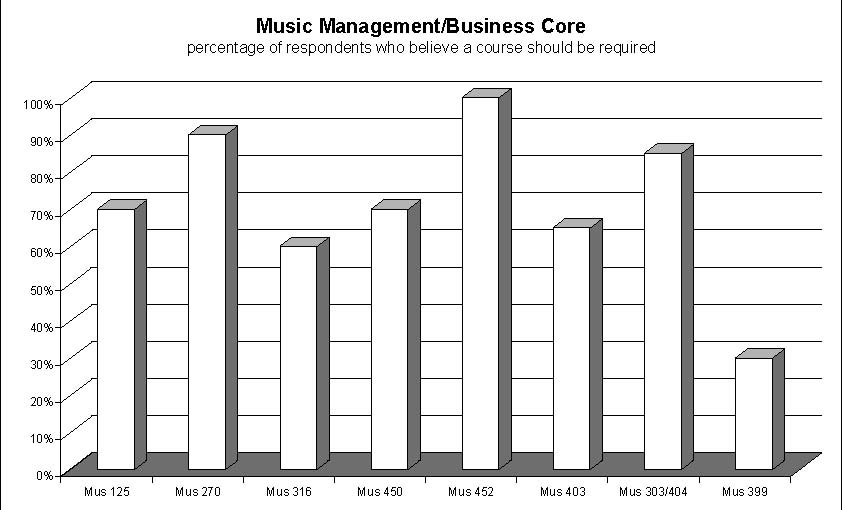
Figure 2.
MUS125 (Survey of the Music and Entertainment Industry) MUS270 (Structure and Content of the Music Industry) MUS316 (Media Use in Music Industry) MUS450 (Personal Management in Music) MUS452 (Law and Ethics in the Music and Entertainment Industry) MUS403 (Music Management Seminar) MUS303/404 (Music Management Internship) MUS399 (Surviving in the New Millennium)
The Music Core
With the exception of Mastery of a Principal Instrument or Voice, all the courses in the music core are required. Respondents were not inclined to identify these courses as very important, as only Music Technology received a mean score of over four (4.2). Conducting received the lowest mean of score of the entire survey (1.79) (see Figure 5).
General Education Core
Three courses in the core, Communication in Action, Social Science, and the Humanities requirement received mean scores of four or higher. (see Figure 6).
Recommendations
The William Paterson University Department of Music is accredited by the National Association of Schools of Music (NASM). NASM has requirements that must be met in order to retain accreditation. Based on the results of the survey (and with accreditation requirements in mind) the author makes the following curricular recommendations:
1. The music business core received very high recommendations. Because the emphasis of this curriculum is on the record business, and the respondents commented on the need, a course in record company operations will be added to the curriculum.
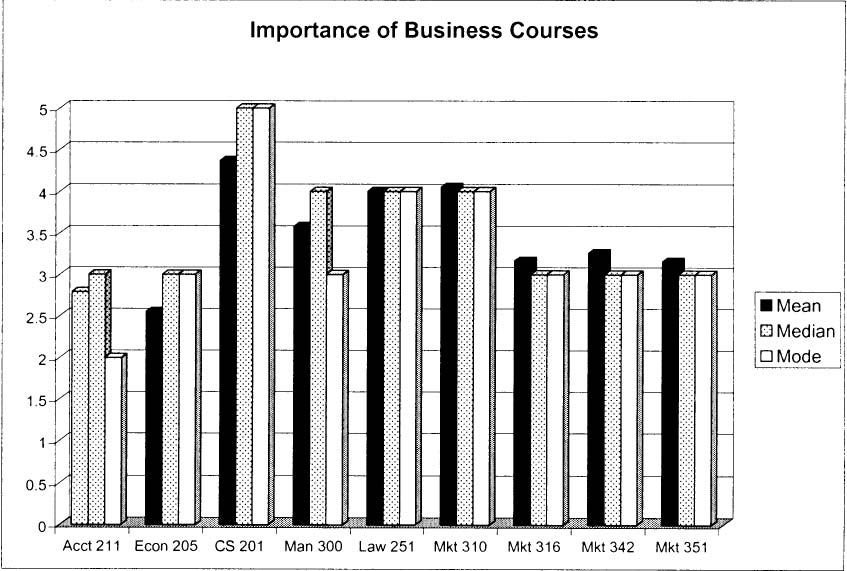
Figure 3. Respondents rate the importance of business courses on a 1-5 scale.
Acct211 (Financial Accounting 1) Econ205 (Macroeconomics) CS201 (Computer Literacy) Man300 (Principles of Management) Law251 (Business Law 1) Mkt310 (Marketing) Mkt316 (Multinational Marketing) Mkt342 (Retail Marketing) Mkt351 (Sales Management)
An evaluation will be undertaken to determine if the course Surviving in the New Millennium should continue to be offered.
Although Computer Literacy received the highest recommendation in the business core, it is no longer required by the management school and will therefore be dropped as a requirement. It will be replaced by either a marketing course or Business Law, with emphasis on globalization.
Conducting will be eliminated as a requirement and replaced by Record Company Operations.
Business Core
percentage of respondents who believe a course should be required

Figure 4.
Acct211 (Financial Accounting 1) Econ205 (Macroeconomics) CS201 (Computer Literacy) Man300 (Principles of Management) Law251 (Business Law 1) Mkt310 (Marketing) Mkt316 (Multinational Marketing) Mkt342 (Retail Marketing) Mkt351 (Sales Management)
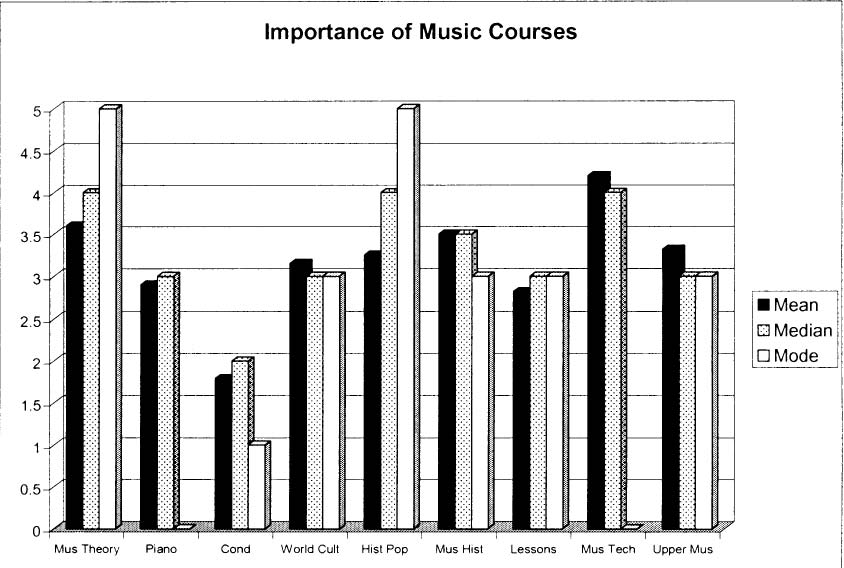
Figure 5. Respondents rate the importance of music courses on a 1-5 scale.
Comparison with the Western Illinois University Study (1999-2000)
Although the coursework in the two surveyed curricula vary, there are some significant comparisons that can be made. All responses were scored using a Likert-type scale of 1 to 5 (1 = not important to 5 = very important). All are listed in order of mean scores.
Almost 100 percent of the William Paterson University (WPU) respondents who are currently employed in the industry are working in the record business and its peripheral businesses (personal management, entertainment law, internet companies, etc.) in New York City, Los Angeles, or Nashville. 44 percent of the Western Illinois University (WIU) respondents indicated they were currently employed in the industry. However, their positions varied greatly: record companies, music products, retail, and school services.
It appears that the graduates of both universities value the internship experience as a priority. The WPU graduates rate Law and Ethics as very
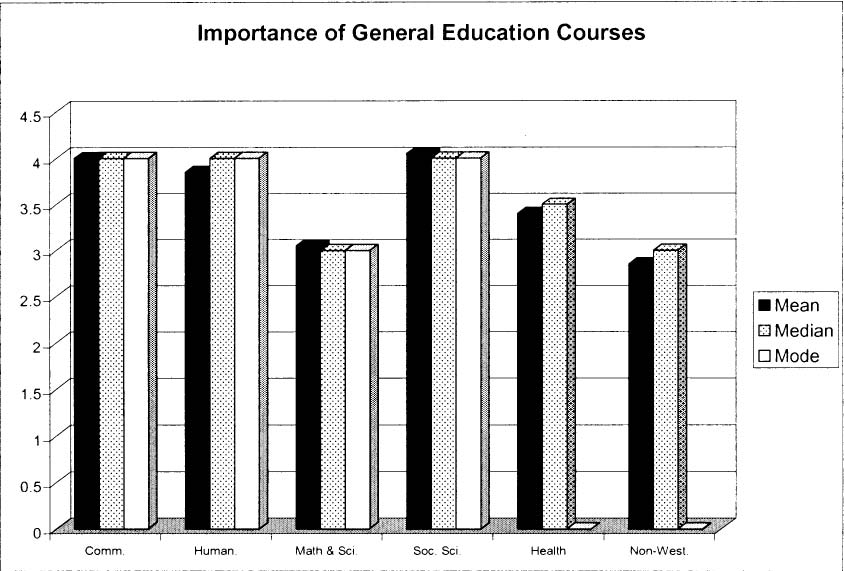
Figure 6. Respondents rate the importance of general education courses on a 1-5 scale.
important followed closely by lectures from industry experts whereas the WIU graduates rated the survey courses higher (see Figure 7).
When asked which courses should be required (Figure 8), the responses varied greatly. The author suspects these variations are job related. Even though the surveys advised respondents to “answer each [question] as it relates to the industry in general rather than to your specific career,” it is reasonable to assume that personal experience did have an affect on responses.
When the business core was examined, the comparisons were easier to track. Although the means differed, the responses were more similar than with the music management/core. However, WPU students continued to rate the law courses higher than WIU (see Figure 9).
When asked to rate which courses should be required, the WPU alumni rated the first four courses in the same order as they did for importance. Except for one course, WIU alumni did the same. It should be noted that William Paterson students choose one of the last three courses to complete, and for each of these courses, only three people responded (see Figure 10).
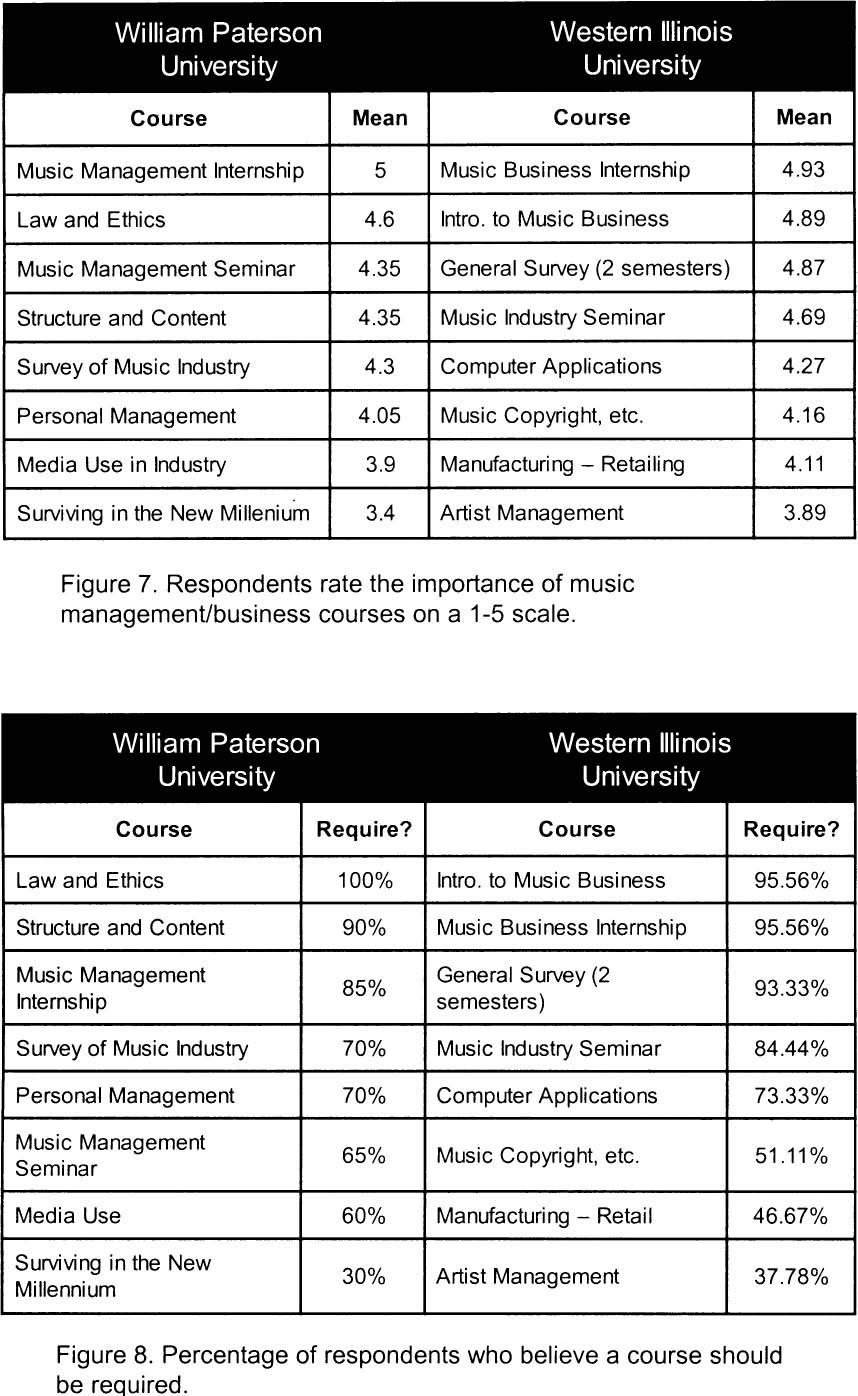
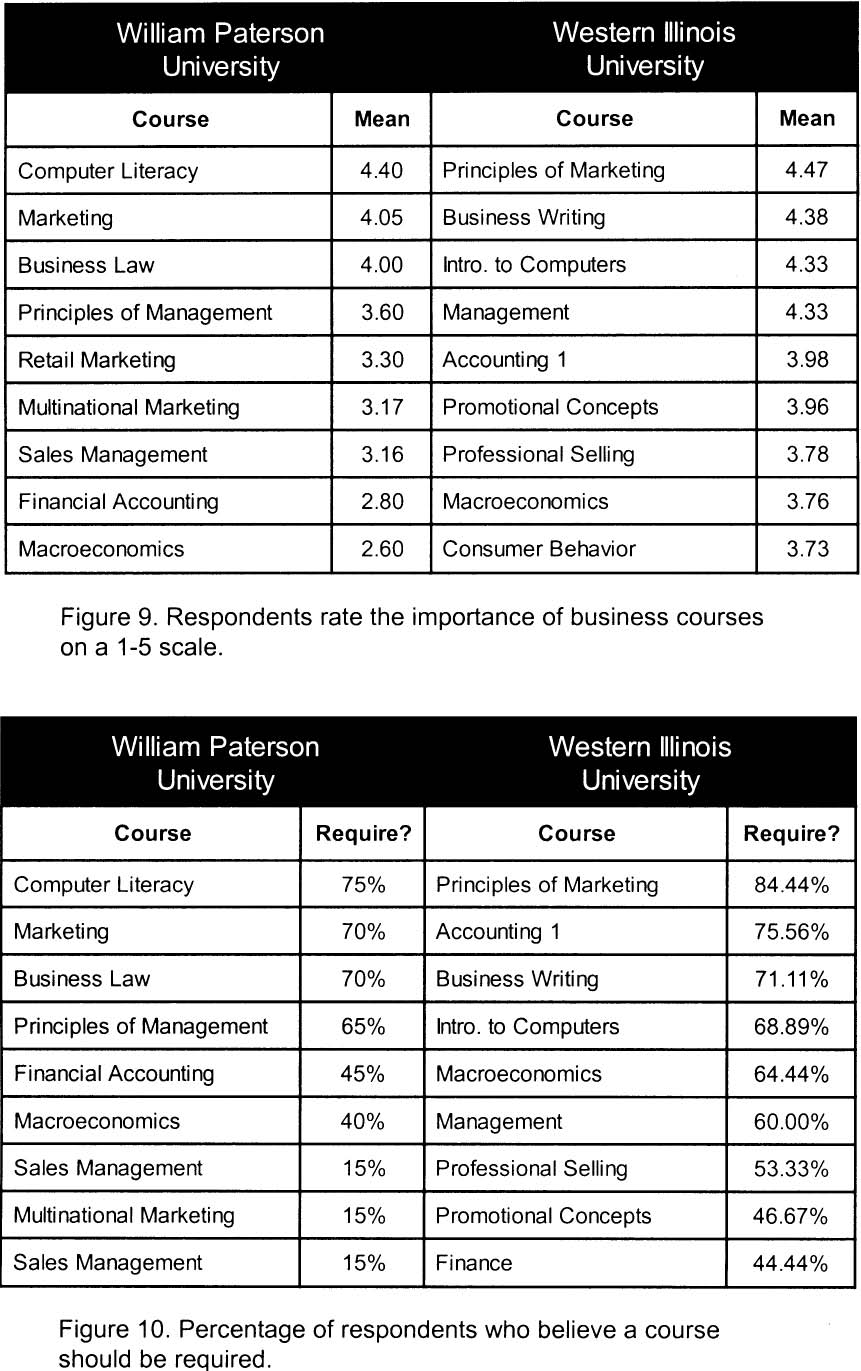
The last category for comparison is the required music courses. This comparison was also made easier because of the similar requirements. Here, the order of preference of each group of students was nearly identical, with music technology receiving the highest priority and conducting receiving the lowest. Conducting received the lowest mean of all the courses in both surveys (see Figure 11).
Conclusion
The location of the William Paterson University (a short drive from New York City) makes a career in the recording industry very accessible. It seems the opinions of the WPU respondents reflect the value they place upon courses that they believe foster success in that industry. Western Illinois University is not located near the center of the recording industry. However, they are located near a center of the musical instrument manufacturing industry. Their graduates seek a broader variety of music industry positions. Therefore, their needs are more diverse than those of the WPU graduates.
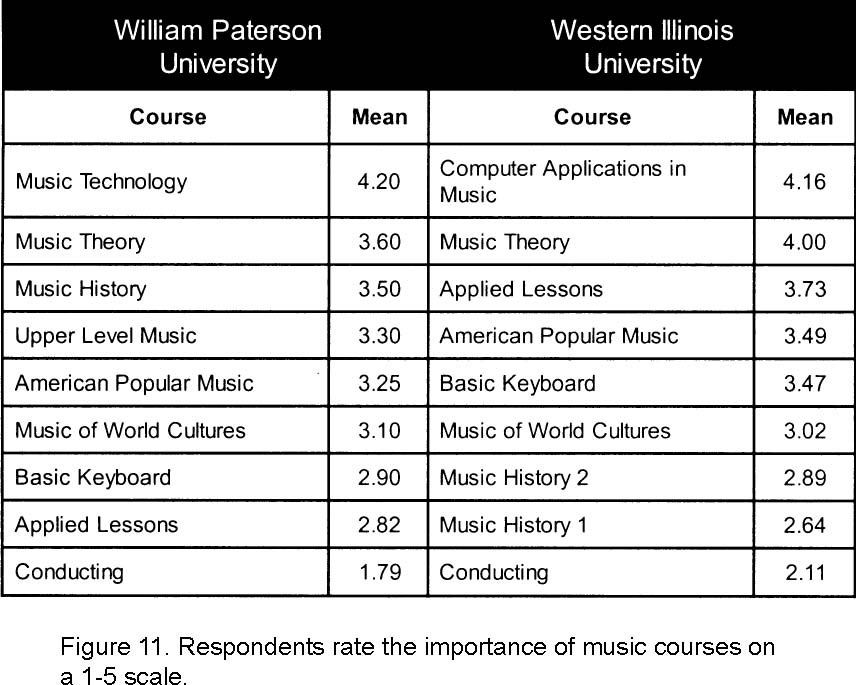
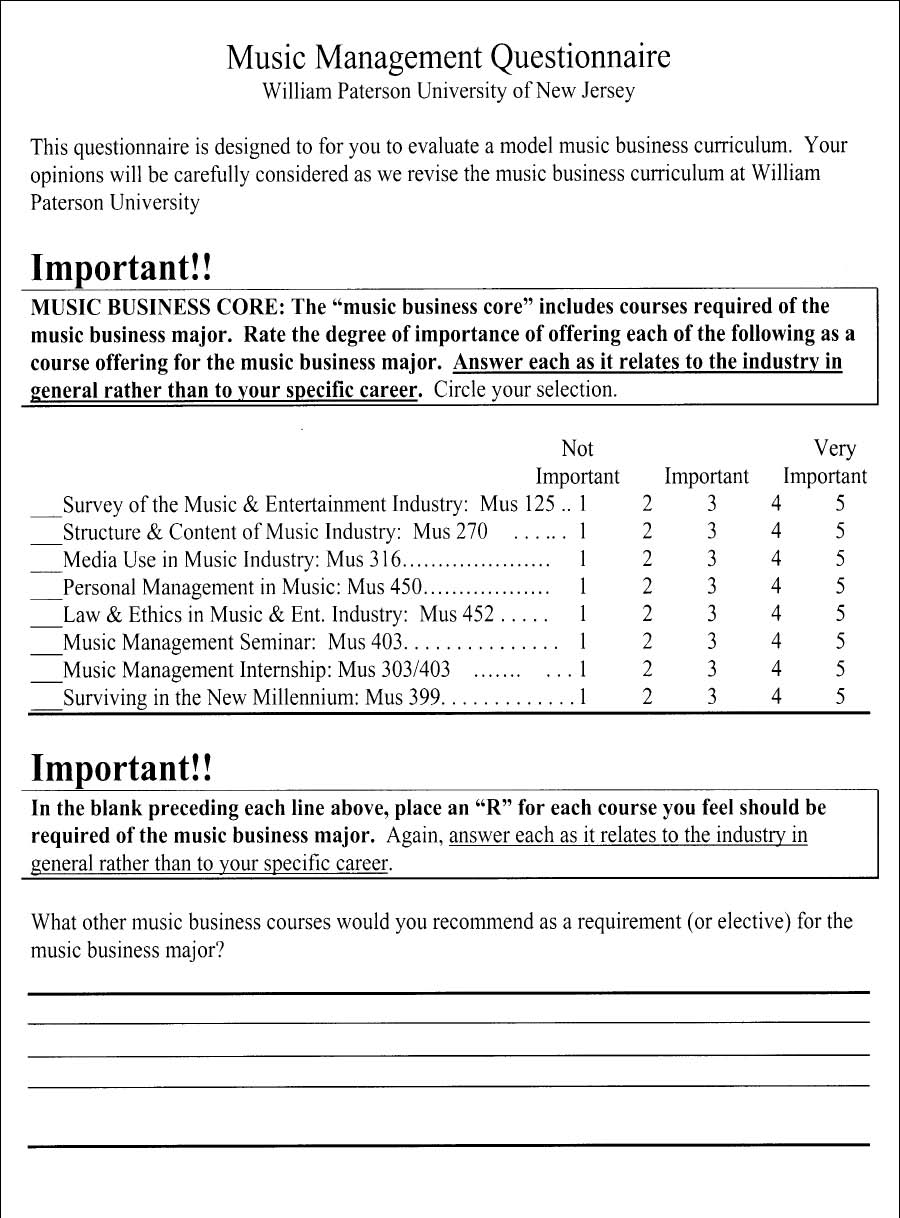
William Paterson University Survey – Page 1
MEIEA Journal
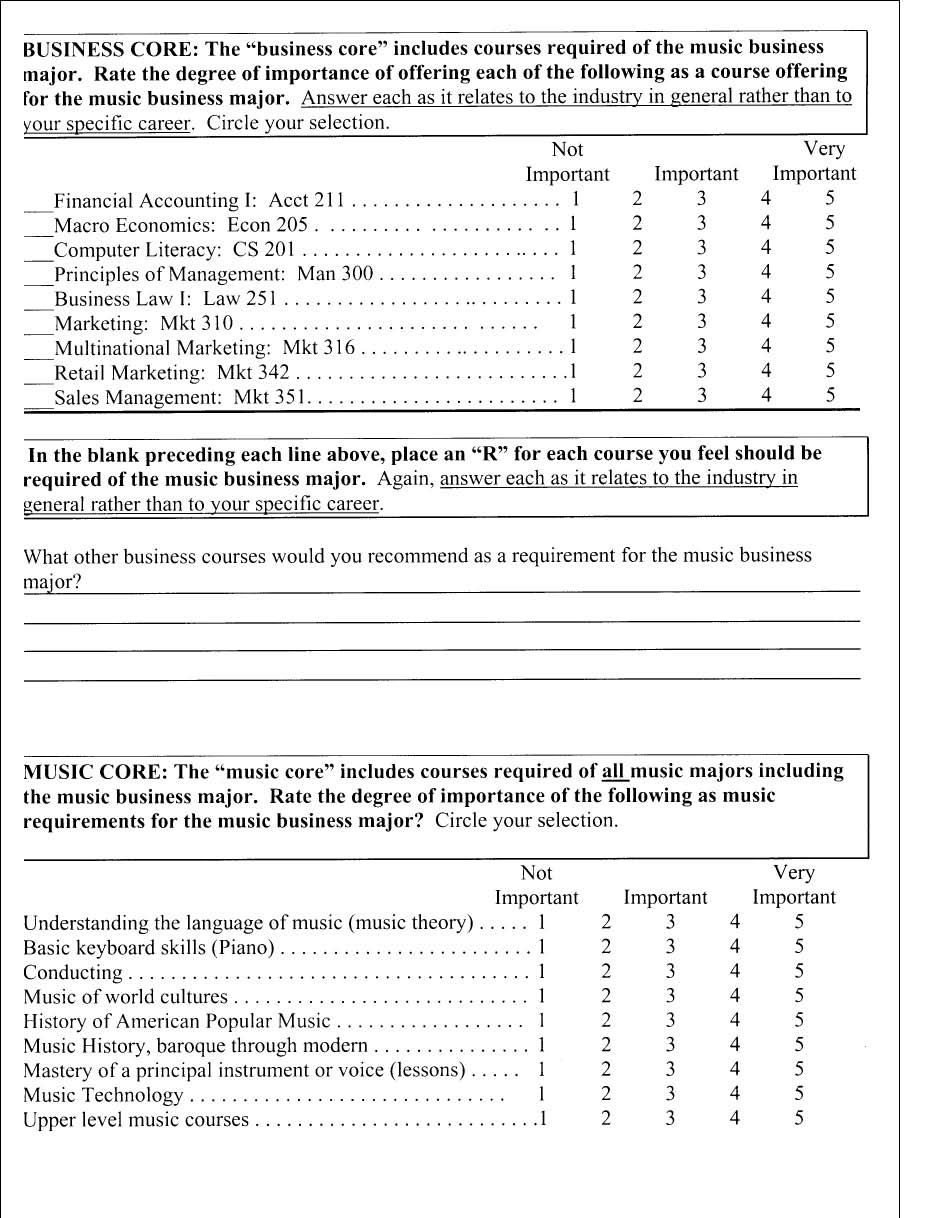
William Paterson University Survey – Page 2
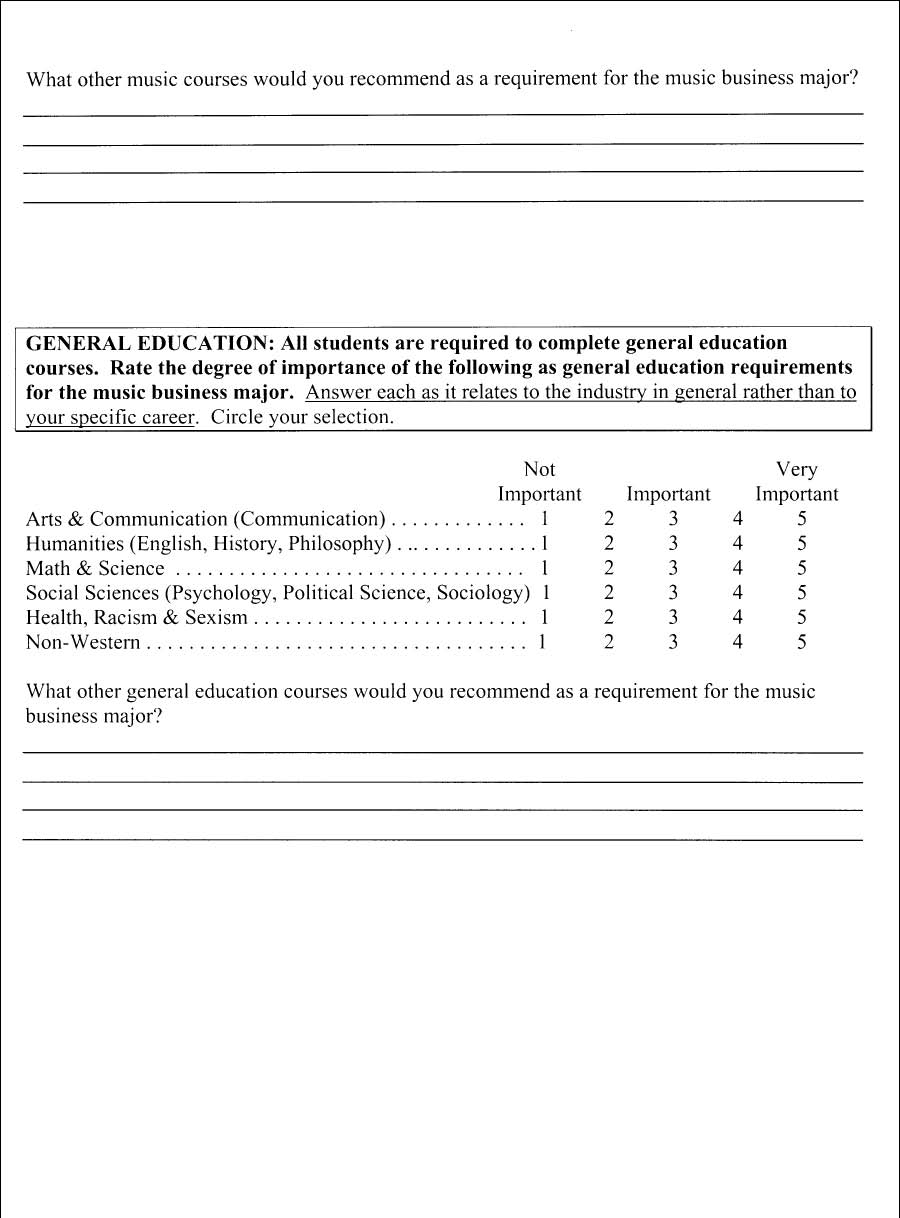
William Paterson University Survey – Page 3
MEIEA Journal
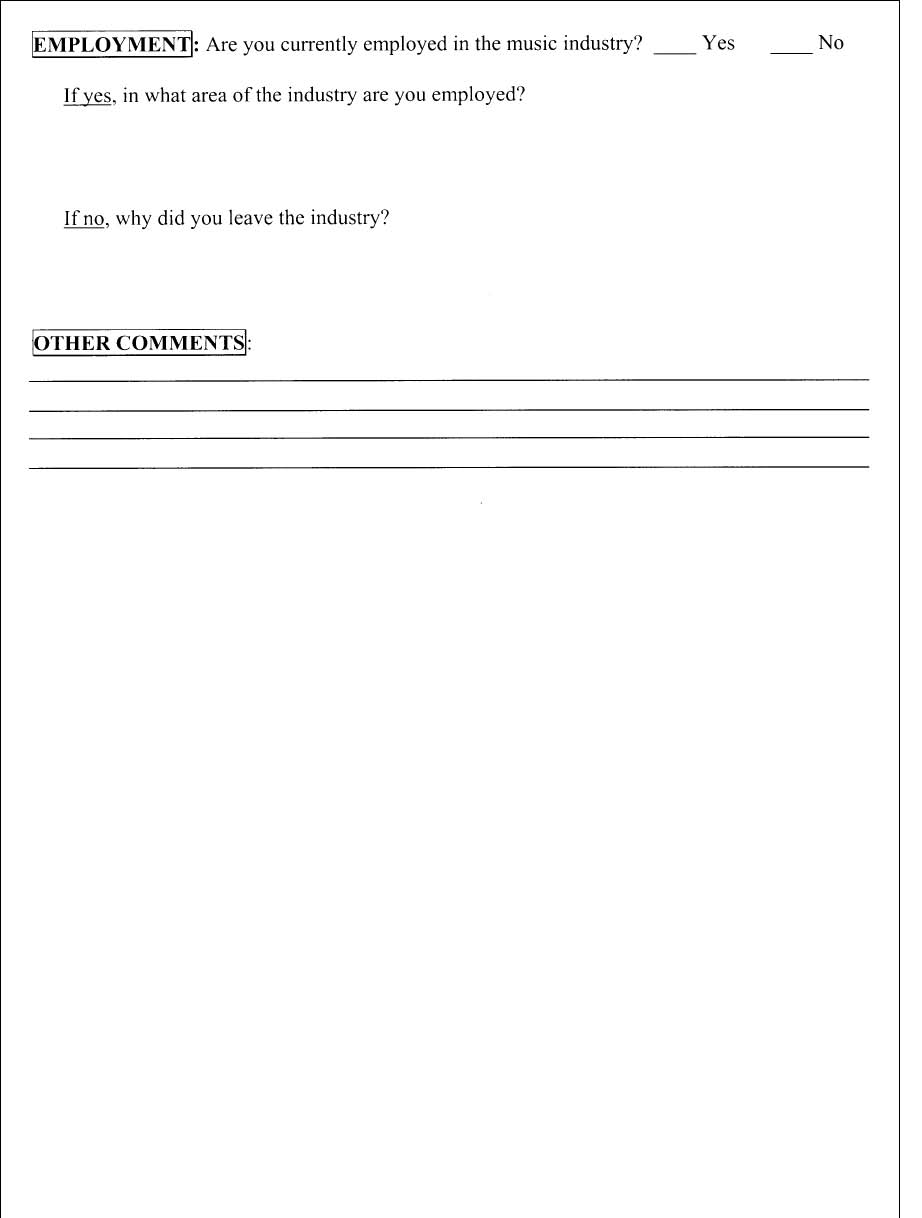
William Paterson University Survey – Page 4
References
McCain, Claudia. “A Model Music Business Curriculum.” MEIEA Journal, vol. 2, no. 1 (2002): 14-27.
In the late 1960s, STEPHEN F. MARCONE joined an Epic Records recording group as a trumpet player, and toured the country taking an active role in the creative and managerial aspects of the ensemble. In 1973, he joined the faculty of the School of Music at Syracuse University where he taught until 1984. During that time, he was also vice president of the Syracuse Musicians Association (Local #78). In 1984, he came to the William Paterson University of New Jersey where he was chairperson of the music department for fifteen years, and is currently graduate studies director and program coordinator of the Music Management Program.
He has published articles in Music Educators Journal, The Instrumentalist, NAJE Journal, and Musician Magazine. Marcone has lectured at: the Hartt School of Music, New York University, College of the Finger Lakes, MENC National and Regional Conferences, College Music Society Annual Meetings, National Association of Schools of Music annual meetings, New Jersey Music Educators Association, New Jersey Artist-Teacher Institute, and the Music and Entertainment Industry Educators Association (MEIEA). He is the author of Managing Your Band distributed by Hal Leonard (now in its third edition), and is a frequent lecturer for the New Jersey Council on the Humanities. Each summer Marcone conducts his University’s Summer Jazz Ensemble. Dr. Marcone holds the B.A., M.M., and Ed.D. from Syracuse University.